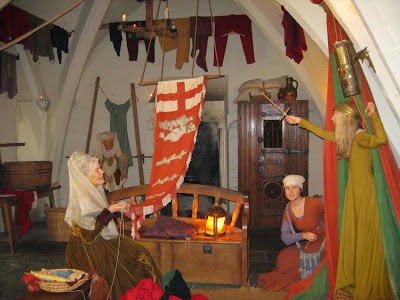Warwick Castle is
an imposing fortress from the outside, and an excessive display of 18th
century conspicuous consumption in the state rooms inside--as well as a great photo op. Strategically
located on the Avon river, it has been a fortress in one form or another for
twelve hundred years, with most of the current castle built during the late
middle ages. The Castle is most impressive as a medieval fortress. It was a
scene of mighty battles from the time of William the Conqueror and figured
actively in the 15th Century War of the Roses.
|
|
The castle was purchased in 1978 by the Madam Tussaud (Museum) Group, and wax figures and recorded voices dominate many of the display rooms. I found it a bit cheesy. On the other hand, with dozens of small boys brandishing wooden swords and almost every girl queued for the princess tour. I’m probably not the target audience.
|
 After the War of
the Rose and with the Tudors arrival, the castle fell into disrepair. Its next
stage in history begins with James I giving it to Sir Fulke Greville, (a
politician of merit and a poet and dramatist) in 1604. A descendent was made
the Earl of Warwick in 1759. Between those two events, the place was steadily
transformed into a family estate—interupted by the Civil War in the 17th
Century and a great fire in the 19th. It stayed in the Greville family for over
370 years, until it was sold in 1978.
After the War of
the Rose and with the Tudors arrival, the castle fell into disrepair. Its next
stage in history begins with James I giving it to Sir Fulke Greville, (a
politician of merit and a poet and dramatist) in 1604. A descendent was made
the Earl of Warwick in 1759. Between those two events, the place was steadily
transformed into a family estate—interupted by the Civil War in the 17th
Century and a great fire in the 19th. It stayed in the Greville family for over
370 years, until it was sold in 1978.
Among the family stories we heard, the
one that most stuck with us was about a studio copy of a Van Dyke portrait of
Charles I and his wife Henrietta Maria (still a very expensive painting). This
was initially a very large painting with both figures full-bodied, but the Earl
had a portrait gallery where all portraits were of the same size in beautiful
gold frames. So he cut out part of the two figures and hung them on each side
of the fireplace. The point was that ostentatious displays of wealth were more
important, though they did leave unscarred grand paintings by Van Dyke, Rubens,
Raphael, and Holbein. In various ways, displays dominate the state and family
rooms. However, later generations of the family go deep into debt and now the
house belongs to Madame Tussaud.
|
 |
Along with the
fine buildings are a number of attractions outside the walls—the engine room
where electricity was first generated by the flow of the river Avon, an
impressive trebuchet, a siege catapult that could launch fireballs (we missed
the demonstration), an archery range, well-designed gardens, including one with a warning:
 |
| Lord Leyceter Hospital |
We spent a little
time walking the town of Warwick. St. Mary’s Church contains the tomb of
Richard Beauchamp, Earl of Warwick, who oversaw the trial and execution of Joan
of Arc; Robert Dudley, long-time suitor of Elizabeth I (who gave him Warwick Castle as a gift), and other nobles.
The original tower and nave were destroyed by a great fire in 1694, but the church remains a
fine instance of English Gothic, especially from the inside. Lord
Leycester Hospital was built for pre-Reformation United
Guilds of Warwick; the buildings were converted after the Civil War into a
refuge for pensioner soldiers and their families. It still serves as a home for
ex-servicemen. It also has a small tearoom with a large fireplace, where we had
a break for tea and scones.
As we toured the
Castle and the grounds, I’m sorry to admit that Monty Python lines kept
recurring in my head, partly because the place looks like a film set and partly
because of the pervasive pop entertainment (mediaeval mayhem, wicked warwick,
mike the knight). Upon seeing a wax knight brandishing a sword, “what, it’s
just a flesh wound;” upon looking out from Guy Tower “English pig-dogs! Go
and boil your bottoms, sons of a silly person! I blow my nose at you;” in
the boxwood gardens, “Knights of Ni, you are just and fair,
and we will return with a shrubbery;" and in the bird display (you see
this one coming), “What is the air-speed velocity of an unladen swallow?" Now I’ve got you
started, haven’t I….The place was made for it.







No comments:
Post a Comment